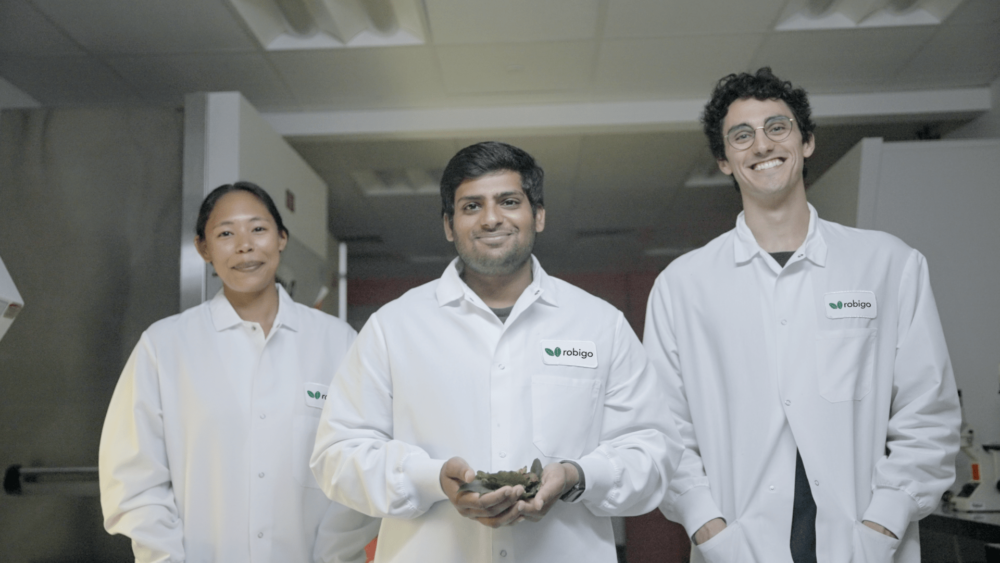US-based Robigo has raised $1.15 million in pre-seed funding for its biopesticide technology platform. Morningside Group, First Star Ventures, and an unnamed angel participated in the round.
Co-founder Connor Sweeney tells AFN that the new funds will go towards expanding the company’s team and its physical lab space in order to further accelerate plant development.
The idea for the Robigo was born in a lab at the Massachusetts Institute of Technology, where Sweeney studied bio-engineering and computer science and met co-founder Jai Padmakumar. Andee Wallace joined later as an additional co-founder.
Robigo makes what it calls “a sustainable living pesticide” that protects crops from various diseases. The startup takes some of the “good” bacteria that naturally live in plants and soil back to the lab, and bioengineers them into what Sweeney calls “molecular vigilantes.”
They are reintroduced into their natural habitat via crop spraying.
“[The bacteria] freely float through the crop of interest benignly, and then they’re ready to kill any specific target pathogen should it show up later in the season,” explains Sweeney.
Between 20% and 40% of crops worldwide are lost to pests each year, while plant diseases cost the global economy roughly $220 billion, according to estimates from the UN Food and Agriculture Organization.
Many of the specifics about Robigo’s system remain undisclosed because of pending patents. But Sweeney says the company has shown, through in vitro proof-of-concept experiments, that the system has over 99% killing efficacy when targeting different strains of Xanthomonas – a genus of bacteria which is responsible for a variety of plant diseases. Robigo hopes to begin targeting other key pathogens soon.
The startup’s biopesticides also offer a safer, more targeted approach than the chemical products most often used in the field. The latter, Sweeney says, kill every microbe in the plant and soil – including the ones that are actually beneficial to plant health. During a presentation at the MIT Delta Demo Day 2021, he also claimed that Robigo’s biopesticides are “often up to 10x cheaper” to produce than existing synthetic treatments.
“Food is one of the most overlooked aspects of a country’s national security in terms of its ability to feed its people and maintain order internationally,” Sweeney tells AFN. “Especially during Covid-19, everybody is super aware of how quickly diseases can spread now and how quickly they can undermine supply chains.”
At the same time, he adds, “we have an investor base who now understands diseases and can understand the idea of trying to vaccinate plants. And you suddenly have tools and synthetic biology that are now mature enough that they can actually be used at scale.”
He emphasizes that Robigo is first and foremost a tech platform and therefore able to work with any crop – though right now the company’s focus is more on specialty vegetables, where bacterial disease pressure is much higher, rather than row crops.
“This is not a limited mechanism of action,” Sweeney says of the platform. “We’re starting with [Xanthomonas] which affects dozens and dozens of different crops around the world. And so that’s an easy way to start because you can move laterally across different crops pretty quickly. But again, broader picture, we want to be looking at all sorts of fruits, specialty and vegetable crops.”
Drew Volpe, managing partner at First Star Ventures, tells AFN that his firm invested with one eye on “huge dollar values” in the agrifood sector, but also because communities worldwide “need to just be able to grow food” – something he believes Robigo can ensure.
“For us it’s a bet on a really great team in a space that is really big and important,” he adds.
Robigo is currently testing its tech on plants grown in the lab. The next step is to use its system in a greenhouse setting. From there, it will start on outdoor field trials.
Sweeney adds that even though Robigo specializes in biopesticides, it is important to give credit to the synthetic chemists that came before. “We haven’t had a famine in the US since 1865, and what was cutting edge then did its job,” he says of synthetic pesticides. “But we also do recognize that there were some really negative externalities with current pesticides, and that they really hadn’t evolved for a hundred years. That’s where we see almost an existential urgency to change.”





